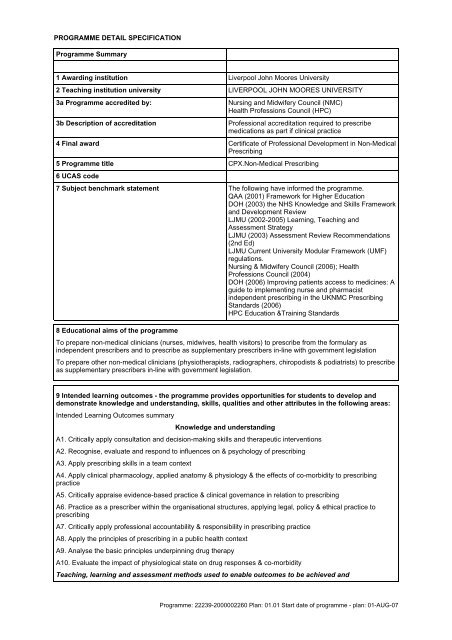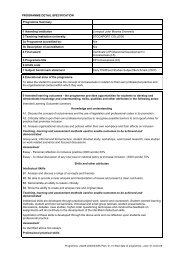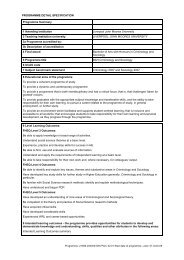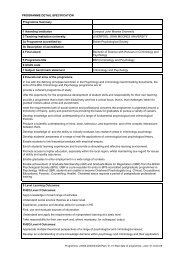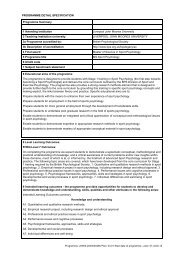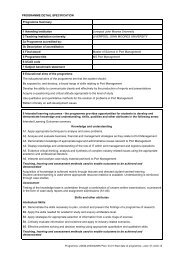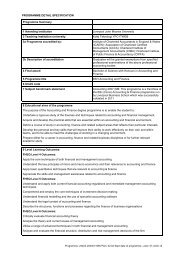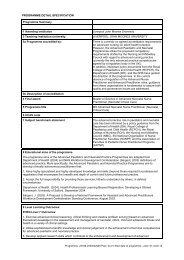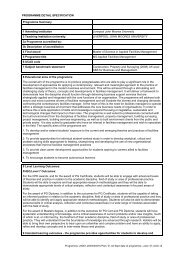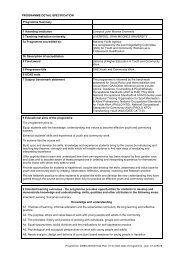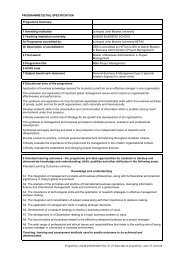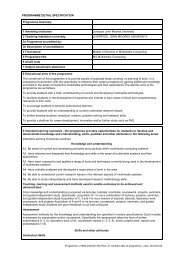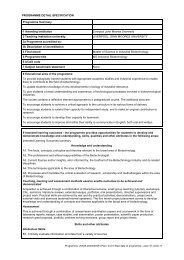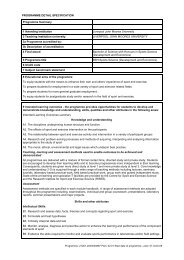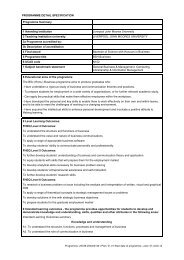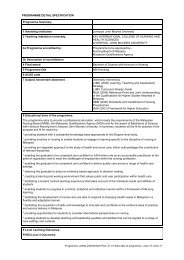Non-Medical Prescribing - Liverpool John Moores University
Non-Medical Prescribing - Liverpool John Moores University
Non-Medical Prescribing - Liverpool John Moores University
You also want an ePaper? Increase the reach of your titles
YUMPU automatically turns print PDFs into web optimized ePapers that Google loves.
PROGRAMME DETAIL SPECIFICATION<br />
Programme Summary<br />
1 Awarding institution <strong>Liverpool</strong> <strong>John</strong> <strong>Moores</strong> <strong>University</strong><br />
2 Teaching institution university LIVERPOOL JOHN MOORES UNIVERSITY<br />
3a Programme accredited by:<br />
3b Description of accreditation<br />
Nursing and Midwifery Council (NMC)<br />
Health Professions Council (HPC)<br />
Professional accreditation required to prescribe<br />
medications as part if clinical practice<br />
4 Final award Certificate of Professional Development in <strong>Non</strong>-<strong>Medical</strong><br />
<strong>Prescribing</strong><br />
5 Programme title CPX.<strong>Non</strong>-<strong>Medical</strong> <strong>Prescribing</strong><br />
6 UCAS code<br />
7 Subject benchmark statement The following have informed the programme.<br />
QAA (2001) Framework for Higher Education<br />
DOH (2003) the NHS Knowledge and Skills Framework<br />
and Development Review<br />
LJMU (2002-2005) Learning, Teaching and<br />
Assessment Strategy<br />
LJMU (2003) Assessment Review Recommendations<br />
(2nd Ed)<br />
LJMU Current <strong>University</strong> Modular Framework (UMF)<br />
regulations.<br />
Nursing & Midwifery Council (2006); Health<br />
Professions Council (2004)<br />
DOH (2006) Improving patients access to medicines: A<br />
guide to implementing nurse and pharmacist<br />
independent prescribing in the UKNMC <strong>Prescribing</strong><br />
Standards (2006)<br />
HPC Education &Training Standards<br />
8 Educational aims of the programme<br />
To prepare non-medical clinicians (nurses, midwives, health visitors) to prescribe from the formulary as<br />
independent prescribers and to prescribe as supplementary prescribers in-line with government legislation<br />
To prepare other non-medical clinicians (physiotherapists, radiographers, chiropodists & podiatrists) to prescribe<br />
as supplementary prescribers in-line with government legislation.<br />
9 Intended learning outcomes - the programme provides opportunities for students to develop and<br />
demonstrate knowledge and understanding, skills, qualities and other attributes in the following areas:<br />
Intended Learning Outcomes summary<br />
Knowledge and understanding<br />
A1. Critically apply consultation and decision-making skills and therapeutic interventions<br />
A2. Recognise, evaluate and respond to influences on & psychology of prescribing<br />
A3. Apply prescribing skills in a team context<br />
A4. Apply clinical pharmacology, applied anatomy & physiology & the effects of co-morbidity to prescribing<br />
practice<br />
A5. Critically appraise evidence-based practice & clinical governance in relation to prescribing<br />
A6. Practice as a prescriber within the organisational structures, applying legal, policy & ethical practice to<br />
prescribing<br />
A7. Critically apply professional accountability & responsibility in prescribing practice<br />
A8. Apply the principles of prescribing in a public health context<br />
A9. Analyse the basic principles underpinning drug therapy<br />
A10. Evaluate the impact of physiological state on drug responses & co-morbidity<br />
Teaching, learning and assessment methods used to enable outcomes to be achieved and<br />
Programme: 22239-2000002260 Plan: 01.01 Start date of programme - plan: 01-AUG-07
demonstrated<br />
Interactive lectures, Clinical scenarios & discussion, Self-directed learning & practice portfolio, Supervised<br />
practice, Reflective practice, e-learning, Practice teaching seminars.<br />
Assessment<br />
Review of portfolio, Statement of competence from medical supervisors, OSCE or video-taped consultation,<br />
Numeracy test, MCQ & short answers including some drug calculations.<br />
Intellectual Skills<br />
Skills and other attributes<br />
B1. Appraising and selecting models for patient consultation<br />
B2. Conducting accurate patient assessment, examination & collating information including a thorough medical<br />
history<br />
B3. Recognising, analysing and synthesising responses to influences on prescribing<br />
B4. Applying problem solving skills & prioritising appropriately<br />
B5. Identifying, evaluating and utilising sources of information etc<br />
B6. Critically reflecting on decision-making processes in practice<br />
B7. Applying numeracy skills to calculate drug doses<br />
Teaching, learning and assessment methods used to enable outcomes to be achieved and<br />
demonstrated<br />
Interactive lectures, Clinical scenarios & discussion, Self-directed learning & practice portfolio, Supervised<br />
practice, Reflective practice, e-learning, Practice teaching seminars.<br />
Assessment<br />
Review of portfolio, Statement of competence from medical supervisors, OSCE or video-taped consultation,<br />
Numeracy test, MCQ & short answers including some drug calculations.<br />
Professional practical skills<br />
C1. Undertaking accurate assessments and medical histories from patients<br />
C2. Using examination and diagnostic skills to gather and analyse appropriate physical data from patients<br />
C3. Evaluating information gathered from all appropriate data sources to devise therapeutic management plans<br />
C4. Evaluating data sources in order to write accurate and informative reports<br />
C5. Accurately assessing team structures to successfully communicate and work effectively within team<br />
parameters<br />
C6. Application of negotiation skills to establish action plans with patients, colleagues and carers<br />
C7. Application of principles of non-medical prescribing to practice, to produce appropriate prescriptions<br />
C8. Consideration and evaluation of all therapeutic options including alternatives to prescription of medication<br />
C9. Understand and apply knowledge of requirements for accurate documentation and record- keeping in<br />
practice<br />
C10. Demonstrate clear understanding of the value of good communication skills in practice<br />
C11. Application of understanding of patients psychological needs and team dynamics to enhance social<br />
interaction in a variety of situations<br />
C12. Using knowledge of legal requirements, information needs and pharmaceutical knowledge to write<br />
accurate prescription forms<br />
Teaching, learning and assessment methods used to enable outcomes to be achieved and<br />
demonstrated<br />
Interactive lectures, Clinical scenarios & discussion, Self-directed learning & practice portfolio, Supervised<br />
practice, Reflective practice, e-learning, Practice teaching seminars.<br />
Assessment<br />
Review of portfolio, Statement of competence from medical supervisors, OSCE or video-taped consultation,<br />
Numeracy test, MCQ & short answers including some drug calculations.<br />
Transferable / key skills<br />
D1. Make critical judgements & decisions in all practice situations<br />
D2. Demonstrates clear understanding of decision-making skills in order to apply prioritising skills to<br />
Programme: 22239-2000002260 Plan: 01.01 Start date of programme - plan: 01-AUG-07
non-prescribing situations<br />
D3. Utilises the skills of decision-making prioritisation and professionalism to be able provide self- direction in<br />
many non-prescribing situations<br />
D4. Apply the knowledge of budgets and financial issues learnt on the programme to be able to manage budgets<br />
in general<br />
D5. Transfer the ability to manage time learned in supervised practice and in managing learning on the<br />
programme to a variety of situations<br />
D6. Utilise knowledge gained on the programme to appropriately involve others with complimentary skills &<br />
value the contribution others make to enhancing patient care and developing practice<br />
D7. Apply knowledge and skills of relationships, psychological and communication needs to work in effectively in<br />
teams in diverse circumstances<br />
D8. Apply the principles of audit, monitoring & evaluation to diverse practice situations<br />
D9. Apply social & information technological skills developed on the programme across a wider range of<br />
activities<br />
Teaching, learning and assessment methods used to enable outcomes to be achieved and<br />
demonstrated<br />
Interactive lectures, Clinical scenarios & discussion, Self-directed learning & practice portfolio, Supervised<br />
practice, Reflective practice, e-learning, Practice teaching seminars.<br />
Assessment<br />
Review of portfolio, Statement of competence from medical supervisors, OSCE or video-taped consultation,<br />
Numeracy test, MCQ & short answers including some drug calculations.<br />
10. Route/Pathway/Field requirements, levels, modules, credits and awards<br />
This 45 credit certificate of professional development consists of three 15 credit nodules running concurrently. It<br />
has both formal academic and clinically based assessment.<br />
Successful competion of the programme will allow nurses NMC recognition to prescribe indepentently (V300),<br />
and other healthcare professionals HPC recognition to prescribe in a supplementary role.<br />
Award Requirements<br />
Certificate of Professional Development in <strong>Non</strong>-<strong>Medical</strong> <strong>Prescribing</strong><br />
For information about awards, see http://www.ljmu.ac.uk/Academic_Enhancement/121984.htm<br />
Level 6 Potential Awards on completion Certificate of Professional<br />
Development<br />
Core Option Award Requirements<br />
6084PQHEAL PRINCIPLES OF<br />
NON-MEDICAL PRESCRIBING<br />
6085PQHEAL PRACTICE OF<br />
NON-MEDICAL PRESCRIBING<br />
6086PQHEAL PHARMACOLOGY<br />
FOR NON-MEDICAL PRESCRIBING<br />
45 core credits at level 6<br />
0 option credits at level 6<br />
0 elective credits at level 6<br />
11 Opportunities for work-related learning ( location and nature of activities)<br />
12 Criteria for admission<br />
Other<br />
All entrants to the programme must meet the following requirements:<br />
Be able to demonstrate valid registration on current parts of the professional register maintained by the<br />
appropriate professional body.<br />
Meet the minimum criteria set by the appropriate professional body for entry to the non-medical prescribing<br />
programme<br />
Have current, appropriate experience in the area in which they will be prescribing and at least three years<br />
professional experience<br />
Practice in an area where there is an identified need for independent and/or prescribing.<br />
Programme: 22239-2000002260 Plan: 01.01 Start date of programme - plan: 01-AUG-07
Hold a recognised qualification/acknowledged experience and ability in diagnostics and physical examination<br />
skills to enable him/her to apply non-medical prescribing skills to their intended area of prescribing practice<br />
Has acknowledged, appropriate numeracy skills to undertake drug calculations<br />
Support from the employing organisation in the form of a statement from the trust prescribing lead and the<br />
students immediate manager that the student is in a suitable post to benefit from the programme.<br />
Possess ability to study at bachelors degree level (level 3) as detailed below.<br />
Have a designated medical practitioner who will provide supervision, support, assessment and opportunities to<br />
develop competence in the area of expected practice.(This includes shadowing opportunities). This is arranged<br />
as part of a tri-partite agreement between the Trust prescribing lead, the line manager and the designated<br />
medical supervisor. The agreement is formalised on the programme nomination from which carries the<br />
signatures of all parties to the agreement.<br />
Supply evidence of current CRB approval.<br />
13 Information about assessment regulations<br />
All elements of this programme shall normally be completed within 12 months of commencement of the<br />
programme. The programme MUST be competed in its entirety within 24 months. This is a condition of the<br />
professional regulatory bodies.<br />
14 Indicators of quality:<br />
External inspections<br />
The programme is subject to external quality assurence processes in a number of ways.<br />
An experienced external examiner has been appointed to the programme who has worked with non-medical<br />
prescribing programmes for a conisderable time. Another external examiner form the HPC professions has also<br />
been appointed to the programme panel.<br />
The local Strategic Health Authority has mechanisms in place for "fitness-for-purpose" and "value for money"<br />
review.<br />
15 Support for students and their learning<br />
Academic support and tutorial system.<br />
APL guidance<br />
SHA & Trust support<br />
Designated medical practitioner/supervisor<br />
E-learning & in-house web-based system (e.g. Blackboard)<br />
Course support materials (e.g. supervisors handbook, prescribing portfolio, student handbook, e-learning<br />
resources<br />
Faculty / School handbooksWelfare provision (<strong>University</strong> student support network)<br />
16 Methods for evaluating and improving the quality and standards of teaching and learning<br />
Subject standards for all taught programmes of study are specified using an outcome based learning model.<br />
Attainment is measured against the standard and individual student performance is moderated at assessment<br />
boards. This involves both internal moderation (by LJMU staff and/or partner institution staff) and external<br />
moderation (by External Examiners). Internal annual programme self-assessment is informed by broad ranging<br />
student feedback, external examiners and academic staff who conduct module review. External quality<br />
assessment by Professional Statutory Regulatory Bodies and the Quality Assurance Agency for Higher<br />
Education confirms that standards are set at the appropriate level and that quality of learning opportunities are<br />
subject to continuing improvement. The quality of teaching is assured through staff review and staff development<br />
in learning, teaching and assessment. Designated committees have responsibility for the oversight of processes<br />
wherein quality and standards are evaluated and improved.<br />
Please note: This specification provides a concise summary of the main features of the programme and the<br />
learning outcomes that a typical student might reasonably be expected to achieve and demonstrate if he/she<br />
takes full advantage of the learning opportunities that are provided. More detailed information on the learning<br />
outcomes, content, teaching, learning and assessment methods of each module can be found in the student<br />
module guide and course handbook. The accuracy of the information contained in this document is reviewed by<br />
the <strong>University</strong> and may be checked by the Quality Assurance Agency for Higher Education.<br />
17 Key sources of information about the course can be found in:<br />
Programme: 22239-2000002260 Plan: 01.01 Start date of programme - plan: 01-AUG-07
Further details may be obtained from a series of handbooks for students that together provide comprehensive<br />
information. Detailed programme information is contained in definitive documentation for the programme. The<br />
Virtual Learning Environment (VLE) is increasingly used to provide module specific information.<br />
18 Progress Files<br />
Increasingly, academic guidance is provided within a framework of personal development planning linked to<br />
progress review.<br />
Programme: 22239-2000002260 Plan: 01.01 Start date of programme - plan: 01-AUG-07


